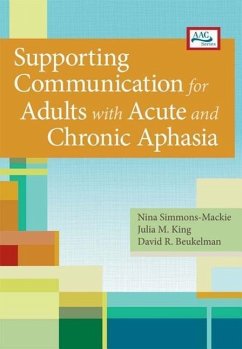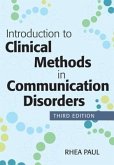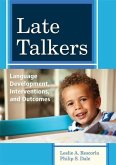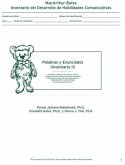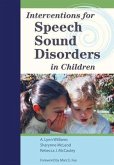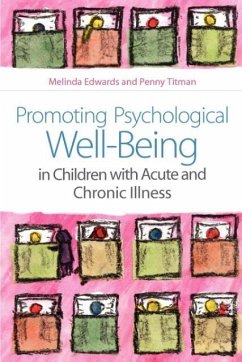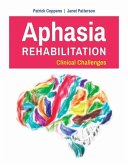Supporting Communication for Adults with Acute and Chronic Aphasia
Herausgeber: Simmons-Mackie, Nina; Beukelman, David R; King Fischer, Julia M
Supporting Communication for Adults with Acute and Chronic Aphasia
Herausgeber: Simmons-Mackie, Nina; Beukelman, David R; King Fischer, Julia M
- Broschiertes Buch
- Merkliste
- Auf die Merkliste
- Bewerten Bewerten
- Teilen
- Produkt teilen
- Produkterinnerung
- Produkterinnerung
How can SLPs and other practitioners provide the best supports for adults with aphasia-and help them make a successful return to daily life? Clear answers are in this comprehensive text, the definitive guide to research-based strategies, supports, and technologies that improve outcomes for adults with chronic or acute aphasia.
Andere Kunden interessierten sich auch für
![Introduction to Clinical Methods in Communication Disorders Introduction to Clinical Methods in Communication Disorders]() Introduction to Clinical Methods in Communication Disorders61,99 €
Introduction to Clinical Methods in Communication Disorders61,99 €![Late Talkers Late Talkers]() Late Talkers60,99 €
Late Talkers60,99 €![MacArthur Inventario del Desarrollo de Habilidades Comunicativas (Inventario) MacArthur Inventario del Desarrollo de Habilidades Comunicativas (Inventario)]() Donna Jackson-MaldonadoMacArthur Inventario del Desarrollo de Habilidades Comunicativas (Inventario)34,99 €
Donna Jackson-MaldonadoMacArthur Inventario del Desarrollo de Habilidades Comunicativas (Inventario)34,99 €![Interventions for Speech Sound Disorders in Children Interventions for Speech Sound Disorders in Children]() Interventions for Speech Sound Disorders in Children89,99 €
Interventions for Speech Sound Disorders in Children89,99 €![Promoting Psychological Well-Being in Children with Acute and Chronic Illness Promoting Psychological Well-Being in Children with Acute and Chronic Illness]() Melinda EdwardsPromoting Psychological Well-Being in Children with Acute and Chronic Illness42,99 €
Melinda EdwardsPromoting Psychological Well-Being in Children with Acute and Chronic Illness42,99 €![Aphasia Rehabilitation: Clinical Challenges Aphasia Rehabilitation: Clinical Challenges]() Patrick CoppensAphasia Rehabilitation: Clinical Challenges105,99 €
Patrick CoppensAphasia Rehabilitation: Clinical Challenges105,99 €![Macarthur-Bates Communicative Development Inventories (CDI) Words and Sentences, Ncs Scannable, English Macarthur-Bates Communicative Development Inventories (CDI) Words and Sentences, Ncs Scannable, English]() Larry FensonMacarthur-Bates Communicative Development Inventories (CDI) Words and Sentences, Ncs Scannable, English42,99 €
Larry FensonMacarthur-Bates Communicative Development Inventories (CDI) Words and Sentences, Ncs Scannable, English42,99 €-
-
-
How can SLPs and other practitioners provide the best supports for adults with aphasia-and help them make a successful return to daily life? Clear answers are in this comprehensive text, the definitive guide to research-based strategies, supports, and technologies that improve outcomes for adults with chronic or acute aphasia.
Hinweis: Dieser Artikel kann nur an eine deutsche Lieferadresse ausgeliefert werden.
Hinweis: Dieser Artikel kann nur an eine deutsche Lieferadresse ausgeliefert werden.
Produktdetails
- Produktdetails
- Verlag: Brookes Publishing Company
- Munication Series! edition
- Seitenzahl: 368
- Erscheinungstermin: 22. April 2013
- Englisch
- Abmessung: 254mm x 177mm x 22mm
- Gewicht: 637g
- ISBN-13: 9781598572681
- ISBN-10: 1598572687
- Artikelnr.: 36703944
- Herstellerkennzeichnung
- Produktsicherheitsverantwortliche/r
- Europaallee 1
- 36244 Bad Hersfeld
- gpsr@libri.de
- Verlag: Brookes Publishing Company
- Munication Series! edition
- Seitenzahl: 368
- Erscheinungstermin: 22. April 2013
- Englisch
- Abmessung: 254mm x 177mm x 22mm
- Gewicht: 637g
- ISBN-13: 9781598572681
- ISBN-10: 1598572687
- Artikelnr.: 36703944
- Herstellerkennzeichnung
- Produktsicherheitsverantwortliche/r
- Europaallee 1
- 36244 Bad Hersfeld
- gpsr@libri.de
Nina Simmons-Mackie Ph.D., BC NCD is Professor and Scholar in Residence at Southeastern Louisiana University in Hammond, LA., an Honorary Professor at the University of Queensland, Brisbane, AU and Research Consultant at the Aphasia Institute in Toronto. Julia King Fischer, Ph.D., is a Professor in the School of Communication Sciences and Disorders at the University of Wisconsin-Stevens Point. She has authored publications about supporting communication and AAC intervention for adults with chronic aphasia and adults with primary progressive aphasia. Her research and clinical interests focus on supporting communication for adults with complex communication needs. David R. Beukelman, Ph.D was the Barkley Professor of Communication Disorders at the University of Nebraska-Lincoln, Director of Research and Education of the Communication Disorders Division, Munroe/Meyer Institute of Genetics and Rehabilitation at the University of Nebraska Medical Center, a research partner in the Rehabilitation Engineering and Research Center in Augmentative and Alternative Communication, and a senior researcher in the Institute for Rehabilitation Science and Engineering at the Madonna Rehabilitation Hospital. With Pat Mirenda, he co-authored the textbook, Augmentative and Alternative Communication: Management of Severe Communication Disorders in Children and Adults. He served as editor of the Augmentative and Alternative Communication Journal for four years. Nancy B. Alarcon, M.S., CCC-SLP, BC-ANCDS, Senior Lecturer and Clinic Director, Department of Speech and Hearing Sciences, University of Washington, 1417 NE 42nd Street, Seattle, Washington 98105 Ms. Alarcon directs the outpatient teaching clinic at the University of Washington and supervises in the area of adult neurologic communication disorders. Her clinical work in this area with colleagues has focused on supported communication intervention in aphasia, the impact of group treatment in reducing social isolation, and long-term patient/family intervention in primary progressive aphasia. Kyla Brown, Ph.D., Postdoctoral Research Officer, Centre for Clinical Research Excellence in Aphasia Rehabilitation and Communication Disability Centre, The University of Queensland, St. Lucia, QLD 4072, Australia Dr. Brown is a postdoctoral research officer in the Centre for Clinical Research Excellence in Aphasia Rehabilitation and the Communication Disability Centre at The University of Queensland in Brisbane, Australia. Her research interests are in the area of acquired neurogenic communication disorders, with a particular focus on social or functional approaches to aphasia rehabilitation. Natalie M. Douglas, M.A., Doctoral Candidate and Speech-Language Pathologist, Department of Communication Sciences and Disorders, University of South Florida, 4202 East Fowler Avenue, PCD1017, Tampa, Florida 33620 Ms. Douglas is a doctoral candidate and speech-language pathologist working with adults in acute care and skilled nursing facilities. She studies the implementation of best practices for adults with cognitive-communicative disorders. Roberta J. Elman, Ph.D., F-CCC-SLP, BC-ANCDS, President and Founder, Aphasia Center of California, Oakland, California Dr. Elman is President and Founder of the Aphasia Center of California, a nonprofit organization providing treatment, clinical research, and training and consultative services. She is an internationally invited speaker and author of numerous professional publications, an American Speech-Language-Hearing Association Fellow, and a board certified member of the Academy of Neurologic Communication Disorders and Sciences. Rachel A. Goff, M.S., CCC-SLP, Speech-Language Pathologist and Doctoral Candidate, Department of Communication Sciences, University of South Florida, 4202 East Fowler Avenue, Tampa, Florida 33620 Ms. Goffâ (TM)s primary clinical and research interest is adult neurogenics. Her research explores predictors of the treatment outcomes for individual and group aphasia rehabilitation. Brooke Grohn, BSpPath (Honours), Centre for Clinical Research Excellence in Aphasia Rehabilitation and Communication Disability Centre, School of Health and Rehabilitation Sciences, The University of Queensland, St. Lucia, QLD 4072, Australia Ms. Grohn is completing her doctorate at The University of Queensland, Brisbane, Australia. Her research focuses on how people with aphasia live successfully during the first year poststroke and how early intervention programs may be implemented to improve the quality of life of people with acquired neurogenic communication disorders. Judy Harvey, M.S., Speech-Language Pathologist, Department of Special Education and Communication Disorders, University of Nebraskaâ "Lincoln, 350 Barkley Memorial Center, Post Office Box 830731, Lincoln, Nebraska 68583 Ms. Harvey is a doctoral candidate in communication disorders at the University of Nebraska--Lincoln. Her research interests include intervention for individuals with acquired brain injury. Deborah Hersh, Ph.D., Associate Professor in Speech Pathology, School of Psychology and Social Science, Edith Cowan University, 270 Joondalup Drive, Joondalup, Western Australia 6027, Australia Dr. Hersh has more than 20 years of clinical and research experience in speechlanguage pathology and has worked in the United Kingdom and Australia. She has presented and published in the areas of discharge practice, professional-client relationships, clinical ethics, group work for chronic aphasia, and goal setting in therapy and is a Fellow of Speech Pathology Australia. Jacqueline J. Hinckley, Ph.D., CCC-SLP, Associate Professor Emeritus, University of South Florida, 4202 East Fowler Avenue, PCD1017, Tampa, Florida 33620 Dr. Hinckley is a clinical researcher, trainer, and clinician with more than 25 years of experience in neurogenic communication disorders. She is interested in developing tools, techniques, and processes that improve the provision of therapy services, and her current work focuses on the implementation of evidence-based practices in clinical settings. Elizabeth Hoover, M.S., CCC-SLP, BC-ANCDS(A), Clinical Assistant Professor, Department of Speech and Hearing Sciences, Boston University, 635 Commonwealth Avenue, Boston, Massachusetts 02215 Ms. Hoover is Clinical Director of the Aphasia Resource Center. She holds adultfocused board certification from the Academy of Neurogenic Communication Disorders and Sciences. Jennifer Horner, Ph.D., J.D., CCC-SLP, Professor and Associate Dean for Research and Graduate Studies, College of Health Sciences and Professions, Ohio University, Grover Center W380, Athens, Ohio 45701 Dr. Hornerâ (TM)s scholarship focuses on law and ethics. She holds the CCC-SLP from the American Speech-Language-Hearing Association and is board certified by the Academy of Neurologic Communication Disorders and Sciences. Erline V. Nakano, M.S., CCC-SLP, Clinical Speech-Language Pathologist, Department of Communication Sciences and Disorders, University of South Florida, 4202 East Fowler Avenue, PCD1017, Tampa, Florida 33620 Ms. Nakano is a clinical speech-language pathologist who works in the area of cognitive rehabilitation of adults with traumatic brain injury. She is pursuing her Ph.D. in adult neurogenic disorders at the University of South Florida. Robyn Oâ (TM)Halloran, Ph.D., Postdoctoral Research Fellow, Centre for Clinical Research Excellence in Aphasia Rehabilitation, La Trobe University, Bundoora, Victoria 3086, Australia Dr. Oâ (TM)Halloran worked for more than 10 years as a speech pathologist with adults with acquired neurogenic communication disorders before completing a masterâ (TM)s degree and then a Ph.D. in speech pathology at The University of Queensland. She is a lecturer in the Department of Human Communication Sciences at La Trobe University, Victoria. Amy D. Rodriguez, Ph.D., Postdoctoral Fellow, Centre for Clinical Research Excellence in Aphasia Rehabilitation, The University of Queensland, St. Lucia, QLD 4072, Australia Dr. Rodriguez is a speech-language pathologist and rehabilitation scientist. Her research focuses on the development of novel treatment approaches that incorporate principles of neuroplasticity to promote language recovery in aphasia. Sarah Taylor, B.S., Speech-Language Pathology Graduate Student, Department of Special Education and Communication Disorders, University of Nebraska--Lincoln, 318 Barkley Memorial Center, Lincoln, Nebraska 68583 Ms. Taylor received her B.S. degree from University of Nebraska--Lincoln and is currently completing her M.S. degree from the same university. Her future plans include starting a career in the medical setting and pursuing a doctoral degree. Cara Ullman, M.A., Research Technology Specialist/Research Coordinator, University of Nebraska--Lincoln, 114 Barkley Memorial Center, Lincoln, Nebraska 68583 Ms. Ullman has worked in research for more than 12 years in both scientific and applied research programs. Her research interests are speech science and disordered motor speech. Kristy S.E. Weissling, SLP.D., CCC-SLP, Assistant Professor of Practice, Department of Special Education and Communication Disorders, University of Nebraska--Lincoln, 277 Barkley Memorial Center, Post Office Box 830731, Lincoln, Nebraska 68583 Dr. Weissling is a clinical supervisor at the Barkley Speech-Language and Hearing Clinic at the University of Nebraska--Lincoln. Her research and teaching interests include aphasia, cognitive-communication disorders, and augmentative and alternative communication. Linda Worrall, BSpThy, Ph.D., Professor, School of Health and Rehabilitation Sciences, The University of Queensland, St. Lucia, QLD 4072, Australia Dr. Worrall is Director of the Centre of Clinical Research Excellence in Aphasia Rehabilitation and Codirector of the Communication Disability Centre at The University of Queensland in Australia. She is also a Fellow of Speech Pathology Australia and Founder of the Australian Aphasia Association.

